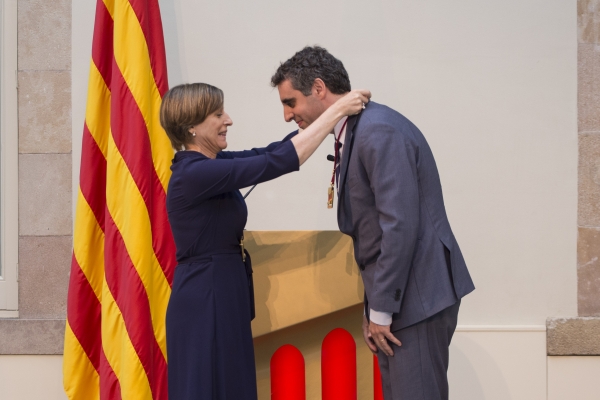Catalonia’s parliament has given today, as part of the celebration of the National Day of Catalonia, the medal of honor in the category of gold to Dr. Manel Esteller, “for his career as a Catalan physician and researcher of international reference”. During the ceremony, the president Carmen Forcadell, and the president of the Generalitat, Carles Puigdemont, have highlighted the importance of research in Catalonia and its contribution to the fight against cancer. Esteller has vouched for the talent and training of future generations.
Last July, the Parliament’s board unanimously agreed to grant the distinction, which recognizes “the research work and achievements” of Dr Esteller “in his fight against human cancer” and “his contribution to the projection of Catalonia as a leading country in scientific research”, also highlighting “his contribution to the collective progress the application of his research represented for areas as diverse as human and social sciences, life sciences and health, engineering, technology and experimental sciences.”
At the beginning of the act, Dr. Jesus Urena, professor at the Faculty of Biology of the University of Barcelona, presented Dr. Esteller’s biography and main achievements.
After that, the president handed the medal to Dr. Esteller, who then pronounced some gratitude words which stressed the importance of research, and the training of future generations, because although “there are still very serious health problems”, we must keep investigating. “I will continue investigating, it is what I do and what I like,” he said, but “the dream” of a “better health for all” sometimes “depends on other people who will come after.” “Please, set today the foundation for a society based on education and knowledge” he asked.
The president thanked Esteller for his commitment to “trying to do, from Catalonia, the world a little better.” Forcadell stressed that “the fight against cancer” is “one the that belongs to all humanity,” adding that “it is a source of pride that our country contributes to this universal task”. She said that “institutions will provide all resources” possible to further enhance research and investigation, main areas “of a society that does not resign”. “And this country, history shows, is not resigned” she said.
Puigdemont stressed that the medal “honors the recipient” but that “we are also honored as a country”. “When we ask what kind of people Catalans are, that is how we want to be known in the world”; “we would like to be recognized as a people who are able to make significant contributions to the change and progress of humanity” said the president. “It is no coincidence that in Catalonia there are pioneer researchers working in areas such as AIDS or cancer.”
The event ended with performances of ‘La Sardana
de l’Abril’, composed by Lluís M. Millet from a poem by Joan Llongueras; ‘L’amor mariner’, composed by Manuel Oltra from a poem by Pere Quart, and finally, ‘Els Segadors’, the national anthem of Catalonia, with the audience standing.

